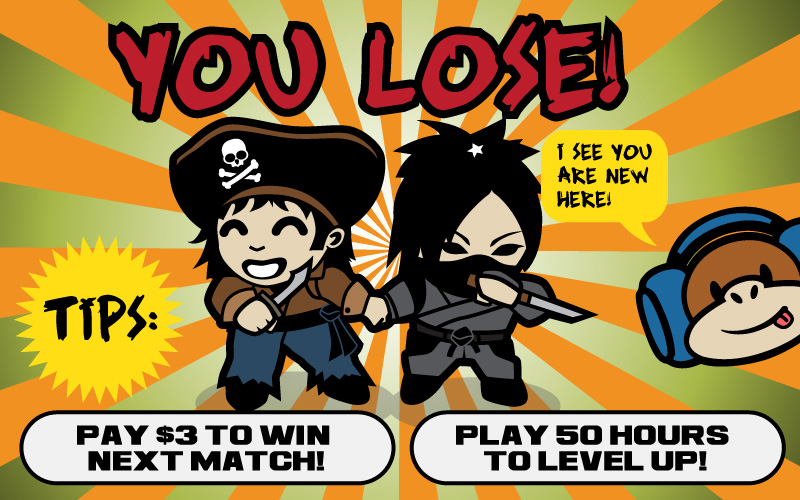
Make no mistake, this is a rant article. Many of my arguments are commonly discussed, but I feel the need to wrap it all up in one nice package to properly present the results of purposefully unbalanced game design.
The danger of unbalanced design first came to my attention while in a public development discussion in my America's Army days. We were having a standard back-and-forth about feature ideas and requests, but one guy was obviously going on a "We should make it like Counter Strike" rant, so I served him up a rant in return about why that is a great example of unbalanced design. Now, before I lose you, I fully understand why people play Counter Strike and have a jolly ol' time with it. Even I blew many hours on it when I was in college.
But that doesn't make it a balanced game. For one, the team that wins the starting match has a large advantage since winning teams get more money each round and can afford better weapons, giving them better chances of winning again. The guy's response to that was something along the lines of, “Well, you shouldn't lose the first match.”
Before that, I had taken all of his comments as fair opinion, but that is where the realization came in that not only did he actually prefer an unbalanced and not particularly "fair" game, but also that he had no idea why.
I'm going to sound like a condescending jerk, but I still think it needs to be said that the common gamer typically has no idea what actually makes a game fun. They can certainly tell you what they like and what they don't, but it tends to take a pro-level gamer or designer to understand everything that is going on. Well-made level design embraces what makes a game fun with a number of considerations, especially in multiplayer. Some examples include time to contact with opponent, appropriateness of weapons/interaction abilities, and balancing structural design on non-symmetrical levels.
In my hope to shed light on the design concepts that I feel are just dick moves, I will also counter with why some people desire them. The overall theme I have a problem with is the classic "it pays to be a winner" idea. Call of Duty’s Kill Streak rewards are an excellent example of this, since they take an already successful player and give them more effective tools to keep the new or less-skilled player down. Call me crazy, but if anyone needs an artificial boost it’s the player who is doing crappy.

Why do people put up with this? I'd say the fun of having a dominating streak is apparently worth it to many gamers, even if achieving one might require them to lose more often than not. As a blast from the past, Monopoly is certainly worth mentioning for allowing something similar. By design, that game was meant to be frustrating and to convey how evil monopolies are. Surprisingly, everyone thought it was fun and the concept backfired. Despite the unbalanced design, players wanted that chance to be the dominant winner sending all their friends to the poor house. With this attitude, it is no wonder that unbalanced video games tend to attract less-than-mature players.
Another facet of this problem is weapon and gear unlocking. Some games offend less than others, but the issue is very prominent when more effective items require unlocking by either achievements or time spent grinding. Again, this is a roundabout way of rewarding an already more experienced player with better tools, while giving new players (who might need help) a disadvantage. Many can't help but to eat this up as this plays on human psychology for the drive of collecting and completing small goals. It is very easy to get caught up wanting to collect doodads and going out of our way to complete ridiculous achievements just to see an icon light up.
Maybe I'm on my own here, but I think competitive games should be balanced by concentration of skill on core game mechanics. Take chess as an example, since it is balanced and as old as dirt. If presented as a modern video game, it would go something like this: Starting players don’t get any knights, but if you win a round you get all of your pieces. If you lose a round, your opponent takes away two of your pawns. If you capture four pieces in a row, then you get to take an additional piece. That sounds cool and fair, right?
There are some sneaky developers that are obviously having design meetings on how to exploit human behavior for profit. Games like Farmville are a near-perfect example for exploitation of our desire to collect and accomplish small goals. As that style becomes more and more popular, there will be more and more opportunities to make people pay for a balanced experience.

In the future, there will be many cases of companies basically seeing what they can get away with when it comes to how much you pay for a game. Then there will be the double-whammy of games that are unbalanced on purpose, just to give you an incentive to pay up and make it balanced, annoying the next new players until they pay as well.
With these points in mind, I only ask you take some time while you are playing that seemingly frustrating game to ponder if you’re really having any fun. Some out there will still say yes, and that is their right, but for those who want change, they are going to have to vote with both their voice and wallet.
Fortunately, games do exist that make a solid balance out of all of these issues. Team Fortress 2 is a great example. The most critical gear and abilities are available from the start, while many variants are later available that tweak stats up and down for preferred playing styles rather than outright being better. The balancing solutions already exist, it is just up to the common gamer to both realize and demand what they want.
VentureBeat's mission is to be a digital town square for technical decision-makers to gain knowledge about transformative enterprise technology and transact. Learn More
